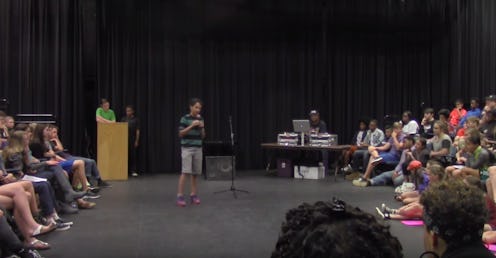
Sometimes, especially if you're a white person or a man (or both), concepts like white privilege and male privilege can be a bit hard to wrap your head around. After all, they're pretty complicated. Or are they? Maybe not. As 8th grader Royce Mann's slam poem "White Boy Privilege" illustrates, you don't need a PhD to understand privilege or to know how to check yours. At its core, the concept is actually pretty simple.
The poem, which the 14-year-old performed as part of his Atlanta, Ga. school's slam poetry competition, uses several concrete examples of his own privilege as a white boy himself. "I can say 'f*ck*ng' and not one of you is attributing that to the fact that everyone with my skin color has a dirty mouth," he says. "I love it because I don’t have to spend an hour every morning putting on makeup to meet other people’s standards."
He also admits that being white and male offers advantages that people — including himself — don't want to give up, which is why privileged people are not always gung-ho on being allies to marginalized groups. He explains:
Dear everyone who isn’t a middle or upper class white boy, I’m sorry. I have started life on the top of the ladder while you were born on the first rung. I say now that I would change places with you in an instant, but if given the opportunity, would I?Probably not. I’m not saying that you and me on different rungs of the ladder is how I want it to stay. I’m not saying that any part of me has for a moment even liked it that way. I’m just saying that I fuckin' love being privileged and I’m not willing to give that away.
In a vulnerable moment in the poem, he addresses another obstacle to allyship from privileged groups: He's afraid to lose the advantages his society affords him. "To be honest, I’m scared of what it would be like if I wasn’t on the top rung, if the tables were turned and I didn’t have my white boy privilege safety blankie to protect me," he says.
The unwillingness to give up privilege is a problem, but it's also necessary to admit. Many people have trouble admitting that they benefit from privilege or even that they have privilege. A study published in the Journal of Experimental Social Psychology found that white people dislike admitting that they have privilege because they don't want to think of themselves as the kind of people who would participate in injustice.
The poem's words sound entitled, but that's the point. These are the thoughts that many people who have white privilege, male privilege, or both have, but might be reluctant to admit — because deep down, we know how it sounds. And we know that we need to be better than that. Mann understands that: By acknowledging that he not only participates in an unjust system but also benefits from it, he is already a step ahead of a lot of us, and many people his age and far older could learn from him.
Images: Sheri Mann Stewart/YouTube